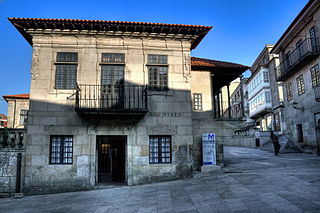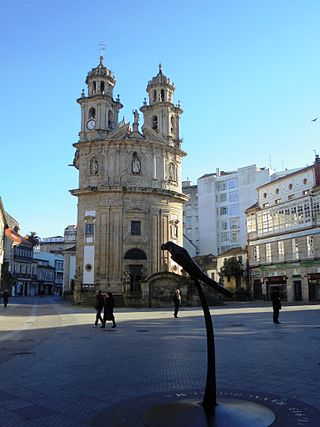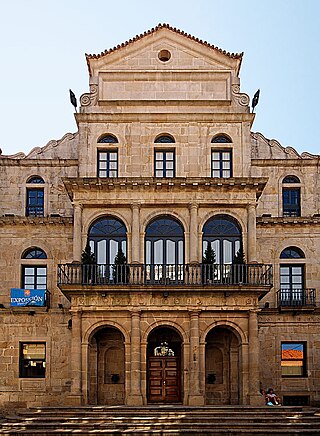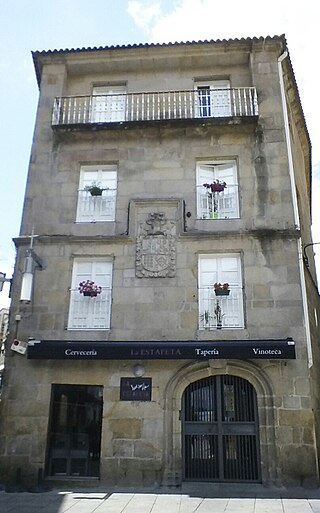
The Palace of Mugartegui, or Palace of the Counts of Fefiñáns in Pontevedra, Spain, is a Baroque pazo dating from the 18th century. It currently houses the headquarters of the Regulatory Council of the Rías Baixas Designation of Origin.

The Palace of the Deputation of Pontevedra, in Pontevedra, Spain, is the seat of the Provincial Deputation of Pontevedra, the provincial government of the province of Pontevedra. It is located between the Alameda de Pontevedra and the Palm Trees Park.

The Plaza de la Leña is a picturesque medieval square located in the heart of the old town of Pontevedra (Spain). It is the most typical medieval square in the historic centre and in Galicia.

The Praza da Ferrería is a large square located on the edge of the old town of Pontevedra (Spain), inside the old city walls. It is the main square of the old town and has an area of about 2,000 m2. It includes the small squares of the Estrella on the north side, the Orense square on the south side and the Casto Sampedro square on the east side, making a total of almost 5,000 m2.

The Principal Theatre of Pontevedra (Teatro Principal de Pontevedra) is a theatre in the old town of Pontevedra (Spain).

The building of the former Pontevedra Normal School of Pontevedra, in Pontevedra, Spain, is an eclectic building from the end of the 19th century that was the headquarters of the teacher training college of this Galician city. It is located on the Gran Vía de Montero Ríos, between the Alameda de Pontevedra and the Palm Trees Park.

The Pazo de García Flórez is an 18th-century baroque pazo located between Sarmiento Street and Plaza de la Leña in the city of Pontevedra, Spain, in the heart of the old town.

The Pazo de Castro Monteagudo, is an 18th-century baroque pazo in Pasantería Street, next to the Plaza de la Leña in the city of Pontevedra, Spain, in the heart of the old town.

The Plaza de Teucro is a square of medieval origin located in the heart of the old town of Pontevedra (Spain). It is the most harmoniously proportioned medieval square in the city.

The Plaza de la Verdura is a square of medieval origin located in the heart of the historic centre of Pontevedra (Spain). It is one of the liveliest medieval squares in the city.

Méndez Núñez Square is a square of medieval origin located in the heart of the historic centre of Pontevedra (Spain).

The Plaza de la Peregrina is an 18th-century square located in the city centre of Pontevedra (Spain), on the edge of the historic centre.

The Liceo Casino is a neoclassical building from 1878 located in the historic centre of Pontevedra, which houses the oldest cultural and leisure society in Pontevedra, Spain.

Curros Enríquez Square is a square of medieval origin located in the heart of the historic centre of Pontevedra (Spain), on the Portuguese pilgrimage way.

St. Joseph's Square is a 19th century square located in the centre of the city of Pontevedra (Spain), in the first urban expansion area, near the Campolongo neighbourhood.

The Plaza del Muelle or Praza do Peirao is a square of medieval origin located at the northern edge of the historic centre of Pontevedra (Spain), very close to the Burgo Bridge and the old port neighbourhood A Moureira.

The Plaza de las Cinco Calles is a square of medieval origin located in the heart of the historic centre of the city of Pontevedra (Spain).

Calle Real is a street in the Spanish city of Pontevedra, located in the city's historic centre.

The Casa del Correo Viejo is a 16th-century Gothic nobleman's house in the old town of Pontevedra, Spain.

Calle Sarmiento is a street in the Spanish city of Pontevedra, located in the city's historic centre.






























